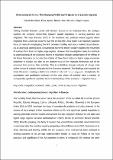Files in this item
Overcoming the crisis : the changing profile and trajectories of Latvian migrants
Item metadata
| dc.contributor.author | McCollum, David | |
| dc.contributor.author | Apsite-Berina, Elina | |
| dc.contributor.author | Berzins, Maris | |
| dc.contributor.author | Krisjane, Zaiga | |
| dc.date.accessioned | 2018-03-20T00:32:43Z | |
| dc.date.available | 2018-03-20T00:32:43Z | |
| dc.date.issued | 2017 | |
| dc.identifier | 245805933 | |
| dc.identifier | e55e08e6-a23f-4b75-94e4-b169603ba388 | |
| dc.identifier | 84988447785 | |
| dc.identifier | 000404939000007 | |
| dc.identifier.citation | McCollum , D , Apsite-Berina , E , Berzins , M & Krisjane , Z 2017 , ' Overcoming the crisis : the changing profile and trajectories of Latvian migrants ' , Journal of Ethnic and Migration Studies , vol. 43 , no. 9 , pp. 1508-1525 . https://doi.org/10.1080/1369183X.2016.1232161 | en |
| dc.identifier.issn | 1369-183X | |
| dc.identifier.other | ORCID: /0000-0001-8716-6852/work/60196123 | |
| dc.identifier.uri | https://hdl.handle.net/10023/12973 | |
| dc.description | The work was funded by the National Research Programme [grant number 5.2.4] and the Latvian Council of Sciences [grant number 514/2012]. | en |
| dc.description.abstract | Taking mobility between Latvia and Western Europe as an empirical lens, this analysis explores the complex relationship between spatial disparities in earning potential and migration. The very dramatic shifts in the economic and political context against which migration from Latvia has occurred over the period 2004-2012 make it an especially apposite focus of research investigating the link between mobility and labour market circumstances. As an analytical starting point, conventional economic theory broadly explains the movement of workers from lower to higher wage regions. However this investigation seeks to contribute to understandings of the economic drivers of migration through consideration of the effects of the Great Recession on not only the volume of flows from Latvia to higher wage economies elsewhere in Europe, but also on the characteristics of the migrants themselves and of the processes that produce their mobility. This is undertaken through analysis of a large scale online survey of Latvian emigrants in five European countries. The findings point towards the Great Recession creating a distinctive cohort of reluctant ‘crisis migrants’. Analytically the quantitative and qualitative attributes of this new phase of mobility raise a number of conceptually significant questions about understandings of the economy – migration nexus. | |
| dc.format.extent | 18 | |
| dc.format.extent | 503682 | |
| dc.language.iso | eng | |
| dc.relation.ispartof | Journal of Ethnic and Migration Studies | en |
| dc.subject | Emigration | en |
| dc.subject | Economic crisis | en |
| dc.subject | Latvia | en |
| dc.subject | Online survey | en |
| dc.subject | Labour migration | en |
| dc.subject | H Social Sciences | en |
| dc.subject | GF Human ecology. Anthropogeography | en |
| dc.subject | NDAS | en |
| dc.subject | SDG 10 - Reduced Inequalities | en |
| dc.subject.lcc | H | en |
| dc.subject.lcc | GF | en |
| dc.title | Overcoming the crisis : the changing profile and trajectories of Latvian migrants | en |
| dc.type | Journal article | en |
| dc.contributor.institution | University of St Andrews. Geography & Sustainable Development | en |
| dc.identifier.doi | 10.1080/1369183X.2016.1232161 | |
| dc.description.status | Peer reviewed | en |
| dc.date.embargoedUntil | 2018-03-19 |
This item appears in the following Collection(s)
Items in the St Andrews Research Repository are protected by copyright, with all rights reserved, unless otherwise indicated.

